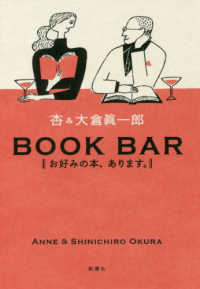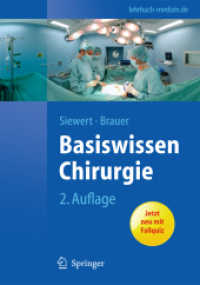- ホーム
- > 洋書
- > 英文書
- > Literary Criticism
Full Description
Did East Asian literatures, ranging from bronze inscriptions to zazen treatises, lack a concept of authorship before their integration into classical modernity? The answer depends on how one defines the term author. Starting out with a critical review of recent theories of authorship, this edited volume distinguishes various author functions, which can be distributed among several individuals and need not be integrated into a single source of textual meaning. Chinese, Japanese, and Korean literary traditions cover the whole spectrum from 'weak' composite to 'strong' individual forms and concepts of authorship. Divisions on this scale can be equated with gradual differences in the range of self-articulation. Contributors are Roland Altenburger, Alexander Beecroft, Marion Eggert, Simone Müller, Christian Schwermann, and Raji Steineck.
Contents
Preface
Introduction
Raji C. Steineck and Christian Schwermann
Composite Authorship in Western Zhōu Bronze Inscriptions: The Case of the "Tiānwáng guǐ" Inscription
Christian Schwermann
Authorship in the Canon of Songs (Shi Jing)
Alexander Beecroft
The Compiler as the Narrator: Awareness of Authorship, Authorial Presence and Author Figurations in Japanese Imperial Anthologies, with a Special Focus on the Kokin wakashū
Simone Müller
Fluidity of Belonging and Creative Appropriation: Authorship and Translation in an Early Sinic Song ("Kongmudoha Ka")
Marion Eggert
Appropriating Genius: Jin Shengtan's Construction of Textual Authority and Authorship in his Commented Edition of Shuihu Zhuan (The Water Margin Saga)
Roland Altenburger
Enlightened Authorship: The Case of Dōgen Kigen
Raji C. Steineck
Index







